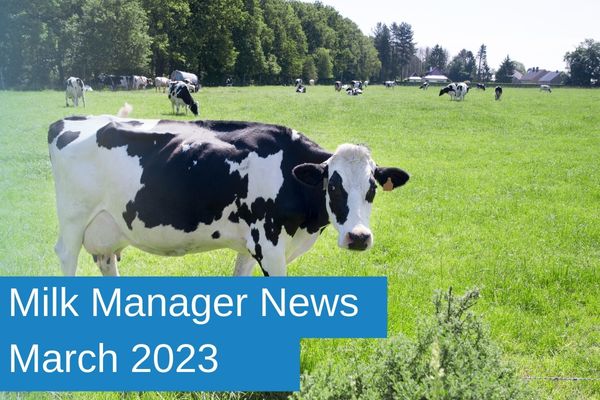Milk Manager News March 2023 – Future Technology on Show at Low Carbon Agriculture Conference
10 March 2023I recently attended the Low Carbon Agriculture Conference at the NAEC in Stoneleigh Park. There were several technology demonstrations across the conference, where companies presented new and innovative equipment to help farmers reduce their emissions and improve their profitability. However, the standout presentation for me was from a small start-up company in England which has developed a micro–Anaerobic Digestion (AD) solution for dairy farms with 100 or more cows.
The technology was originally developed to provide heat and electricity in refugee camps and is now in the final stages of trials before becoming commercially available to farmers in the UK. It enables dairy farmers to utilise their slurry to produce renewable electricity and heat for use on farm. This containerised system enables it to be scaled up or down as slurry production on farm increases or decreases.
Figures on performance and cost are not finalised as the product is still being tested but there are currently two on-farm trials on-going in the UK.
The micro-AD plant at its minimum for 100 cows is made up of two containers: one control unit/combined heat and power plant (CHP) and one digestion unit. As stated above, more digestion units can be added to increase capacity. The processing time for the slurry is estimated to be 12 days, at which point the slurry/digestate can be transferred to a conventional store. This is quicker than more conventional AD plants, where digestion takes around 28 days.
Through initial trials, the technology has been shown to lead to a reduction of around 75% in slurry- related emissions during storage. In addition, a two-container set up is predicted to have an installation cost of £300,000, with a payback period of between 3-7.5 years. In addition to the stated benefits, the micro-AD system will also have lower planning and regulatory constraints due to its small size when compared with larger scale digestors.
If this technology can be successfully developed and rolled out to commercial dairy farms it can be a real game changer for the dairy industry’s carbon footprint and for the wider circular economy. Not to mention insulating dairy producers from fluctuations in energy markets, which is particularly relevant just now. The company developing this technology aims to start rolling out commercial units in mid-2024, so the technology isn’t ready yet, but it is one to look out for.
james.orr@sac.co.uk; 01292 525010
Sign up to the FAS newsletter
Receive updates on news, events and publications from Scotland’s Farm Advisory Service

